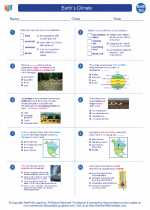Groundwater
Groundwater is the water found beneath the earth's surface in the pore spaces and fractures of rocks and sediment. It is a vital natural resource that plays a crucial role in sustaining ecosystems and providing water for human consumption, agriculture, and industry.
Formation of Groundwater
Groundwater is formed through the process of infiltration, where precipitation such as rain or snowmelt percolates through the soil and into the underlying rock or sediment. This water then fills the pore spaces and fractures, forming underground reservoirs of water.
Characteristics of Groundwater
Groundwater moves very slowly compared to surface water, and it can remain underground for extended periods of time. The quality of groundwater is influenced by the geology of the area through which it flows, and it can contain dissolved minerals and gases picked up from the surrounding rock.
Importance of Groundwater
Groundwater is a vital source of drinking water for many communities around the world. It also sustains rivers and wetlands during dry periods, provides water for irrigation in agriculture, and serves as a critical resource for industrial processes.
Study Guide
- Describe the process of infiltration and its role in the formation of groundwater.
- Explain the factors that influence the quality of groundwater.
- Discuss the importance of groundwater in sustaining ecosystems and human activities.
- Identify and describe the different types of aquifers that store groundwater.
- Examine the challenges and potential solutions related to the depletion and contamination of groundwater.
Understanding the concepts of groundwater is essential for comprehending the Earth's water cycle and the management of water resources. It is also important for addressing issues such as water scarcity, pollution, and sustainable development.
[Groundwater] Related Worksheets and Study Guides:
.◂Earth Science Worksheets and Study Guides High School. Earth`s Climate

 Worksheet/Answer key
Worksheet/Answer key
 Worksheet/Answer key
Worksheet/Answer key
 Vocabulary/Answer key
Vocabulary/Answer key
 Vocabulary/Answer key
Vocabulary/Answer key
 Vocabulary/Answer key
Vocabulary/Answer key
